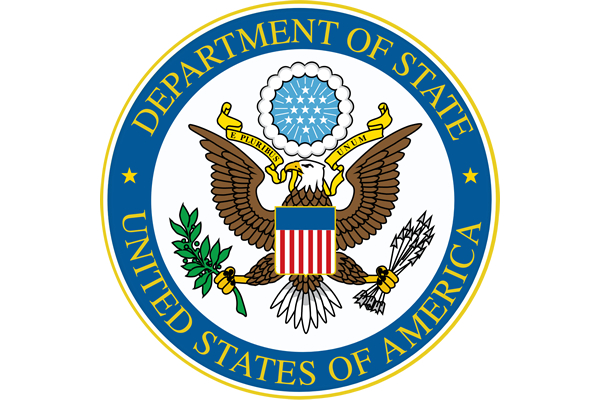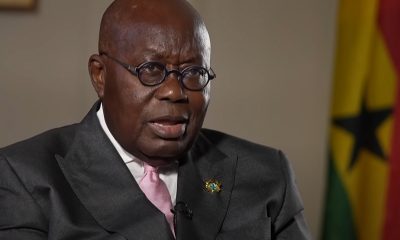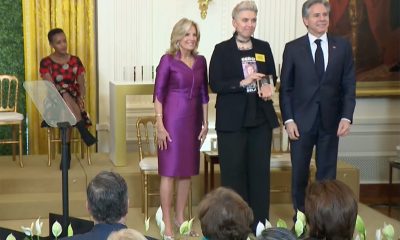World
State Department urges Ghana to protect LGBTQ rights after activists arrest
Workshop attendees taken into custody after ‘unlawful assembly’

The State Department on Monday expressed concern over the arrest of 21 LGBTQ activists in Ghana.
Ghananian police on May 20 arrested the activists in the city of Ho. A State Department spokesperson in their statement said the U.S. “promotes efforts worldwide to protect LGBTQI+ populations from violence and abuse, criminalization, discrimination, and stigma, and to empower local movements and persons seeking to advance the rights of LGBTQI+ persons.”
The spokesperson proceeded to say that the situation in Ghana is on the State Department’s radar and called upon the country’s national leaders and citizens to support and preserve the human rights of LGBTQ Ghanaians.
“We are monitoring the situation closely,” said the spokesperson. “We urge national leaders in Ghana to uphold constitutional human rights protections and to adhere to international human rights obligations and commitments for all individuals. This includes members of the LGBTQI+ community.”
“We call on all Ghanaians to respect the provisions under Ghana’s constitution that guarantee freedom of speech, expression, and peaceful assembly.”
What caused the arrests?
A training for activists and paralegals on how to advocate for LGBTQ Ghanaians and record any infringements of their human rights took place on May 20. Someone tipped off the authorities, and they arrested event detainees.
Alex Kofi Donkor, founder and director of LGBT+ Rights Ghana, told The Guardian that “the [event] was to train them on paralegal services for vulnerable groups – how we can document issues of abuse, and how best these trained paralegals can provide support.”
Authorities deemed the event an “unlawful assembly,” and they immediately arrested 16 men and five women. All were denied bail and are due to appear before a judge on June 4.
Rightify Ghana, a Ghanaian human rights group, in a series of tweets said journalists teamed up with the Ghanaian police when they descended on the event, and took people’s belongings.
“Journalists were the first to storm the place, started taking photos, took their notepads, flip charts, puller banner, books, then locked them while calling the police. The worried victims started crying for help, but today a judge has remanded the 21 queer persons #ReleaseThe21,” said Rightify Ghana.
Rightify Ghana further expressed their disappointment with the Ghanaian media’s actions as it is an entity that has fervently advocated for freedom of press in the West African nation.
“Ghanaian media, which has for decades been advocating for press freedom in Ghana, are enablers in the promotion of hate and discrimination against minority groups in the country, especially sexual minorities. No wonder Ghana is here,” said Rightify Ghana.
The activists’ arrest last week in Ho is the latest of a series of anti-LGBTQ events that have taken place in Ghana.
Ghanaian police officers earlier this year raided and shut down an LGBTQ center.
This action prompted Black celebrities in the West to urge President Nana Akufo-Addo in an open letter to work with LGBTQ community leaders. Some of the celebrities included actor Idris Elba, model Naomi Campbell, and British Vogue Editor-in-Chief Edward Enninful.
In reaction to the recent arrests, prominent human rights groups have expressed their disapproval of LGBTQ human rights abuses in Ghana.
“The arrest of LGBTIQ people holding a lawful, private gathering about protecting and supporting LGBTIQ people in Ghana is shocking, and unacceptable,” said OutRight Action International Executive Director Jessica Stern. “The basic human rights to freedom of assembly and association, enshrined in the country’s constitution, should not be limited by anti-LGBTIQ opinions of bystanders or the police.”
“Those detained should be released immediately, and an investigation into how such a blatant violation of rights could take place has to be held,” added Stern.
“I am deeply saddened that the Ghana police can act on false alarm to arrest and detain innocent citizens,” added Davis Mac-Iyalla, executive director of Interfaith Diversity Network of West Africa. “The human rights defenders arrested and jailed did nothing unlawful, they were exercising their freedom of assembly and association.”
Mac-Iyalla in his statement said “this illegal arrest is a reflection of the high level of discrimination against minorities in Ghana.”
“I call on the government to condemn the arrest and order the release of the human rights defenders,” added Mac-Iyalla. “I also call on religious leaders and all civil society locally and internationally to add their voices to this call.”
Michael K. Lavers contributed to this story.

The Mexican Senate on Thursday approved a bill that would ban so-called conversion therapy in the country.
Yaaj México, a Mexican LGBTQ rights group, on X noted the measure passed by a 77-4 vote margin with 15 abstentions. The Chamber of Deputies, the lower house of Mexico’s congress, approved the bill last month that, among other things, would subject conversion therapy practitioners to between two and six years in prison and fines.
The Senate on its X account described conversion therapy as “practices that have incentivized the violation of human rights of the LGBTTTIQ+ community.”
“The Senate moved (to) sanction therapies that impede or annul a person’s orientation or gender identity,” it said. “There are aggravating factors when the practices are done to minors, older adults and people with disabilities.”
Mexico City and the states of Oaxaca, Quintana Roo, Jalisco and Sonora are among the Mexican jurisdictions that have banned the discredited practice.
The Senate in 2022 passed a conversion therapy ban bill, but the House of Deputies did not approve it. It is not immediately clear whether President Andrés Manuel López Obrador supports the ban.
Canada, Brazil, Belgium, Germany, France, and New Zealand are among the countries that ban conversion therapy. Virginia, California, and D.C. are among the U.S. jurisdictions that prohibit the practice for minors.
South America
Argentina government dismisses transgender public sector employees
Country’s Trans Labor Quota Law enacted in 2021

Protests have broken out across Argentina in recent weeks after the dismissal of transgender people from their government jobs.
President Javier Milei’s action is in stark contract with the progress seen in 2023, where the government’s hiring of trans people increased by 900 percent within the framework of the Trans Labor Quota Law that had been in place since 2021.
Among those affected is Sofia Diaz, a “survivor” who shared her testimony with the Washington Blade hours after she traveled from Chaco Province to Buenos Aires to protest her dismissal.
Presentes, an LGBTQ news agency, reported the government dismissed more than 85 trans employees in less than two weeks.
Diaz, 49, holds a degree in combined arts. She joined the National Social Security Administration (ANSES) in 2022 under the Trans Labor Inclusion Law. The layoffs began in January and left many people feeling uncertain and anguished. It was her turn a few days ago.
Diaz in an interview recounted how the situation became progressively more complicated, with difficulties in accessing information about her employment status and the eventual confirmation of dismissals through WhatsApp messages. This government action, according to Diaz, violates the law.
“We were on a Friday, I think on March 24, in the office and we have a WhatsApp group of other colleagues from all over Argentina who entered through the trans labor quota and they tell us if we can get our pay stubs on the intranet,” Diaz recalled. “So, I tried to enter, I could not, I talked to two other colleagues and they told me no, they could not, and so we went to another person. He couldn’t either.”
“Some people told us that it could be a system error. Well, we were never calm, let’s say not how this issue of installing fear and the perversion with which they do it ends,” she added. “This sadism of … inflicting pain and speculating with your misfortune and so on … is something that characterizes Javier Milei’s government.”
Diaz recalled a list of those dismissed from the agency began to circulate from the union in the afternoon. A colleague passed it on to her, “and well, unfortunately I was also on that list.”
“At that moment the whole weekend went by with anguish, crying, and talking with other colleagues from other places, not only trans, but everyone, everyone and everyone,” she said. “On Monday when we went to try to enter, we could not enter with the biometric, which is the thumb we had to use every morning to enter.”
Despite the difficult moment through which she is going, the trans activist stressed to the Blade that she will continue protesting and will even sue the government because her dismissal is illegal and “violates the constitution itself.”
The LGBTQ community and its allies have mobilized and organized demonstrations, highlighting the importance of defending the rights won and fighting against discrimination and exclusion. Diaz emphasized the fight is not only for the people affected today, but also for future generations, saying the historical memory of the struggles for inclusion and social justice must be kept alive.
“The Argentine government thus faces a key challenge in human and labor rights, where public pressure and social mobilization can play a determining role in protecting the rights of LGBTQ+ people,” Diaz said.
Africa
For queer Nigerians, being on gay dating apps is still a risk
Homophobes target users for violence

Gay hookup apps like Grindr, and dating apps like Tinder and Bumble have managed to proliferate queer communities in countries like Nigeria.
Those who seek one night stands find what they want while those looking for love equally find what they seek. These platforms have managed to position themselves as safe spaces for queer people in anti-gay Nigeria. In recent times, however, it is proving to be unsafe, as homophobic people are quickly learning about the apps, and opening accounts that either seek to outrightly threaten queer people, or pretend to be queer, have long chats with gay people, invite them over, and inflict violence on them.
Take the case of Biodun, a queer Nigerian man who joined Grindr to meet up with guys like him.
After Biodun had built a connection and agreed to meet with someone whose display name was “Mamba,” they decided to meet up only for him to be met with violence. Apparently, Mamba ran a catfish account.
“I’ll never forget that day,” Biodun, who asked the Washington Blade not to use his last name because of safety concerns, said. “I still think about it, and sometimes blame myself for being very careless, even though Grindr was supposed to be our safe space.”
Biodun’s experience isn’t peculiar to him.
In Nigeria, draconian laws that criminalize same-sex relationships exist, making queer people turn to the digital realm to explore their identities and seek connections beyond the confines of societal oppression that comes with the physical environment. Gay dating apps such as Grindr, therefore, have emerged as virtual sanctuaries, offering spaces for queer Nigerians to forge friendships, find solidarity, and pursue romantic or sexual relationships. Spaces like this, however, have morphed into a landscape fraught with danger, as homophobic people have weaponized these platforms to perpetuate hate and violence.
“Sometimes, I often wonder how they learned about these platforms,” Daniel, which is not his real name, told the Blade. “You would think that it is just us in the platforms, until you find out that the accounts are rooted in homophobia.”
One time, someone’s bio read, “I’m only here to deal with the gay people. I know all of you, and I will find and kill you. We no want una for here (translates to we do not want you here, in English.)” It was a stark reminder that these spaces are no longer LGBTQ-friendly for Nigerians. In 2014, there was the passage of the Same-Sex Marriage Prohibition Act by former President Goodluck Jonathan, which not only criminalized same-sex unions, but also imposed severe penalties on anyone involved in LGBTQ advocacy or support.
This law catalyzed a surge in discrimination and violence against queer Nigerians; emboldening regular civilians, religious extremists, and even law enforcement agencies to target individuals perceived as deviating from traditional gender and sexual norms. Again, amid this hostile environment, gay dating apps emerged as lifelines for many queer Nigerians, offering avenues for discreet communication, community building, and the pursuit of intimate relationships.
The very anonymity and freedom these apps provided, however, became double-edged swords.
The advent of screenshot and screen-recording capabilities on these apps, for example, reduced the risks of exposure, strengthening the safety and privacy of users. However, this also comes with its own lapses, as queer people using Grindr have often relied on screenshots and screen recordings to confirm the identities of potentials with their friends, before accepting to meet.
“Before the removal of the screenshot option, I usually shared photos of others with my trusted friends,” Biodun shared. “But since that was taken off, there was no way for me to do that.”
Although, according to Grindr’s terms and conditions, the removal came with privacy concerns, as it was to facilitate a safe dating experience.
This erosion of digital safe spaces is depriving queer Nigerians of vital avenues for self-expression and affirmation,and is exacerbating the psychological toll of living in a society that continues to systematically demonize their identities. Moreover, the normalization of homophobic rhetoric and violence in both physical and digital realms has perpetuated a cycle of fear and oppression, and is reinforcing this notion that LGBTQ individuals are inherently unworthy of dignity and respect. Despite these challenges, though, the resilience of queer Nigerians continue to persist, as they defy societal norms and assert their right to love and be loved.
-

 State Department3 days ago
State Department3 days agoState Department releases annual human rights report
-

 Maryland5 days ago
Maryland5 days agoJoe Vogel campaign holds ‘Big Gay Canvass Kickoff’
-

 Politics4 days ago
Politics4 days agoSmithsonian staff concerned about future of LGBTQ programming amid GOP scrutiny
-

 District of Columbia1 day ago
District of Columbia1 day agoCatching up with the asexuals and aromantics of D.C.










